President-elect Donald Trump has declared plans for tariffs on Chinese, Canadian, and Mexican imports, citing drug trafficking issues as the driving force behind this economic strategy. He aims to impose a 10 percent tariff on China and a 25 percent tariff on Mexico and Canada, retaining these measures until drug-related activities and immigration from these nations are effectively curtailed. This approach illustrates the intersection of trade policy and national security in Trump’s upcoming administration.
President-elect Donald Trump recently announced intentions to impose significant tariffs on imports from China, Canada, and Mexico. Trump stated that he would enact a 10 percent tariff on all Chinese products entering the U.S. and a 25 percent tariff on goods from Canada and Mexico. This decision stems from ongoing concerns regarding the influx of fentanyl and other illicit drugs entering the United States, particularly through Mexico, with Trump asserting that tariffs would remain until drug trafficking and illegal immigration cease.
In a post on his Truth Social platform, Trump expressed his frustration over previous discussions with Chinese officials regarding the drug crisis, emphasizing that their commitments to impose severe penalties on drug dealers had not been realized. He highlighted the alarming levels of drug shipments, especially fentanyl, which he attributed largely to trafficking from Mexico. Trump emphasized, “Until such time as they stop, we will be charging China an additional 10% Tariff… on all of their many products.”
Moreover, Trump cautioned about the rising threats at the U.S.-Mexico border, referring to an imminent caravan of individuals attempting to enter the United States. He indicated plans to sign executive orders imposing the aforementioned tariffs upon taking office on January 20th, aiming to leverage economic measures as a way to manage immigration and drug trafficking. He noted, “…Tariffs would remain until such time as Drugs, in particular Fentanyl, and all Illegal Aliens stop this Invasion of our Country.”
Reports from the Drug Enforcement Agency corroborate Trump’s claims that China and Mexico are primary sources of fentanyl flooding into the U.S. During his 2024 campaign, Trump reiterated these tariff plans as measures intended to mitigate drug-related issues and control immigration. Analysts, including billionaire investor Bill Ackman, interpreted these tariffs as mechanisms for Trump to achieve both economic and political objectives under his America First policy, even before officially taking office.
The U.S. Census Bureau reported that imports from around the world amounted to approximately $4 trillion, with China contributing about $433 billion in goods. Thus, the implications of these tariffs could significantly affect international trade dynamics and U.S. economic policies moving forward.
Donald Trump’s stance on trade and immigration has been a cornerstone of his political platform. The proposal of increased tariffs comes amidst ongoing debates about border security and drug trafficking, particularly concerning the opioid crisis attributed to fentanyl. Tariffs are traditionally employed as tools for protecting domestic industries and influencing foreign policy, and Trump’s threats reflect a broader strategy aimed at addressing perceived national security threats posed by drug trafficking and illegal immigration. The economic implications of such tariffs could reshape not only trade relationships with these countries but also impact the U.S. economy as a whole, given the significant trade volumes involved.
In conclusion, President-elect Donald Trump’s announcement of new tariffs on imports from China, Canada, and Mexico underscores his administration’s commitment to addressing drug trafficking and border security as urgent national concerns. By leveraging economic measures, he seeks to compel these countries to take more stringent actions against drug dealers and undocumented immigration. The implementation of such tariffs could have far-reaching consequences on international trade and domestic economic policies as he transitions into office.
Original Source: www.newsweek.com







